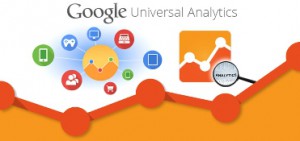Top 3 Reasons You Should Convert To Universal Analytics – Now
July 10, 2014
Why you should convert To Universal Analytics

Currently, both traditional Google Analytics and Universal Analytics are available to track user’s data. Also, you can ease into the transition because for each new property (individual website) you have the option of which Analytics version you want to use. So you don’t have to make a giant leap into the unknown.
That said, transferring from Classic Analytics to Universal Analytics is going to be inevitable. To make this move less of a daunting task we thought of some areas of reporting that we enjoy now that we’re using Universal Analytics. Below are three of the best reasons we believe you should make the switch.
1. Google Will Make You Eventually
Sooner rather than later is a better time to start planning for the change, because migrating to Universal Analytics is going to be inevitable.
Google will do most of the heavy lifting when it comes to the migration. When this portion of the automatic transfer occurs, there will be an alert for the web property on the tracking code page. No need to take any action, this is just Google’s way of letting you know the automated portion of the upgrade has been completed. All of your settings will work as they originally did with Classic Analytics.
Another reason the migration should be done soon is because all of Google’s updated for Analytics are only being sent out for Universal Analytics. If you’re using Classic Analytics you will not receive the most recent updates.
2. Now You Can Track Anything (Custom Variables)
Early Classic Analytics users will remember the ability to use custom variables and how much easier this made tracking your site. For Universal Analytics, Google has brought a variation of this back with custom variables, which will let you track session, page and visitor data in almost any way imaginable. The sky is truly the limit with custom variables in Universal Analytics.
3. Better Tracking
The Universal Analytics tracking code is very different than the code in Classic Analytics. Not to get overly technical, but Universal Analytics gathers all of the information it needs via one cookie. Some of the benefits of this update are easier customization, more flexibility, and in some cases even the ability to track on site actions despite a users disabling cookies.
Another upgrade comes in how users are tracked across multiple devices. With Classic Analytics, a single visitor is tracked multiple times if he/she visits the site on different devices. With the introduction of User ID’s in Universal Analytics visitors’ actions are now tracked and linked to each other across multiple devices.
Universal Analytics. The bottom line is Universal Analytics will become industry standard soon, and making the switch sooner rather than later will allow you to take advantage of all this and more.




